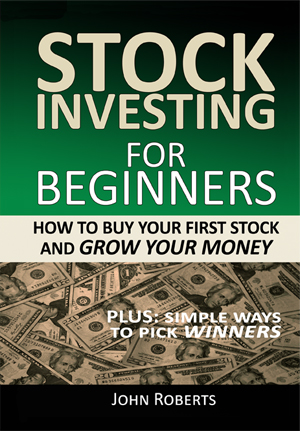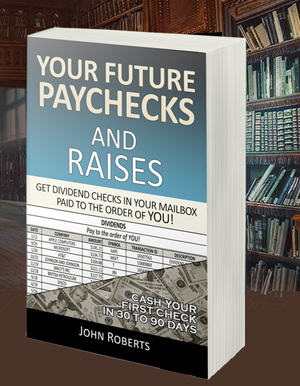Choosing A Broker
You will need a broker to do the trading described in this book. You have a choice here.
You can pay a broker to do your buying and selling for you. Your advantage is you will not have to learn how to place buy and sell orders, and you will have the assurance a professional is doing this for you. Of course, brokers have to eat, so they will charge you for this service.
Or you can open an online discount broker account and do all of your trading yourself. While that option is not free, as the name implies, the fees for trading your online account run at a discount to having a broker do the trades for you.
Some people start by using a broker, then move on to trading their own online account. Or you can start right off with an online account. It depends on your level of confidence.
But millions of people trade online today, so it is not terribly difficult if you apply what you learn here. And most discount online brokers give you the option of talking to one of their live brokers to help you through a transaction if you get confused. They will charge you extra for that transaction, but you can watch and learn and do it yourself next time at the online discount fee.
While the rest of this book is oriented toward you doing your trading with an online account, all of the information is just as valuable to you if you are using a broker. You will be able to communicate well and understand what they are telling you.
One final thought on brokers before we move on to online trading. Since I used to be one, I can tell you what to look for. There are many good and conscientious brokers out there. A good broker should be accessible to you, return your calls, periodically keep you up to date on the status of your account, and they should take the time to explain any transactions that you don’t understand.
Of course, brokers are busy like the rest of us, so unless you have good reason, you shouldn’t be calling them every five minutes — just when you need to.
What to look out for with a broker — well, unless you are a frequent, high volume trader, they should not be calling you constantly trying to get you to buy and sell stocks (unless there is an extraordinary market condition like the bear market in 2008).
Since they are commission based, if you sense your broker is constantly trying to generate trading activity with you, think about getting another broker. That said, there are many conscientious brokers out there so don’t let that last comment throw you.
Now to the online discount broker approach. If you are going to take this route, and there is no reason why most of you shouldn’t, here are some thoughts on choosing one.
There are online discount brokers and super discount brokers. I had trouble with a super discount broker in my commodity options trading past, so I avoid the super discount guys, and go for the more run of the mill discount brokers.
Some brokers that fit this description and are competitors with each other are …
• TDAmeritrade
• Scottrade
• E*Trade
• Fidelity Investments
• Charles Schwab
Setting up and keeping an account with these brokers should be free and the cost per trade (when you buy or sell a stock) should be around $10. Some will be more, some less.
For example, I recently saw a television commercial for Scottrade advertising $7 per trade. Since you probably wont be trading that much, a few dollars more or less is probably not that big of an issue. I tend to choose these things based more on ease of use.
Typically you will not be trading a great deal, so your number of trade transactions may range from none to no more than five or ten in some months. (and that’s kind of high, actually).
Note that I said typically here. I may have had forty trades in one month during the peak of the market problems in 2008 – but that is not typical.
Another consideration is if you work in an office during the day and want to occasionally check on your stocks through your employer’s computer. You will want to make sure the broker you chose can be accessed through your companies’ firewall.
I can tell you from personal experience that TDAmeritrade works fine through the firewalls of companies I’ve worked at in the past, and I have read that Scottrade is set up this way as well.
The others listed above may very well work too, but you will want to verify this up front with them when you are setting up your stock account.
I have used TDAmeritrade for over eight years and been very satisfied with them. They are responsive in case I need to call them – which is rare – and I have recommended them to my friends.
Online broker responsiveness is particularly important to you for two reasons.
The first reason involves setting up your account to get started. Since this requires filling out numerous forms, possibly transferring old 401k plans, and even writing out a check in a certain specific way, it’s important to know you can call them to walk you through the process.
Fortunately, you only have to do this once to get started.
The second reason is when you want to put on your first trade. If you are not totally comfortable with this, it’s probably a good idea to have them walk you through that process.
I would emphasize this point for the first time you sell a stock because you don’t want to accidently sell more than you own. Then you will be short the extra shares. This leaves you with a potentially large financial exposure.
It’s theoretically unlimited. Which means not only could you lose your entire investment, but your house, car and everything else. Don’t let that scare you off. It’s pretty straight forward — just be careful and have them walk you through the process the first time if it looks confusing to you.
One other point is that you only need their basic trading platform. Many of them offer super trading platforms that have more dials, levers, flashing lights and gizmos than you can imagine. There is usually an extra charge for these unless you have an account valued over some limit like $25,000.
To my way of thinking this is all unnecessary and is simply paying extra money for unneeded complexity.
Just keep it simple with basic trades. The keys to success in this book focus much more on getting quality, easy to understand research on what to buy and sell, and doing this in a deliberate manner, rather than trying to be Super Joe Day Trader twisting all the knobs and dials on a complex online screen.
So that’s it on selecting an online discount broker. Once you have bought and sold a few stocks you will start to feel comfortable with the process.
It’s actually quite fun and empowering, in that you are affecting a transaction real time in the world market.



